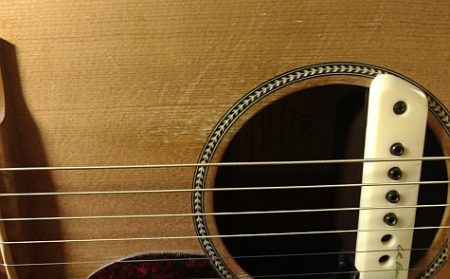 The more we play, the more we become the instrument and the less it feels like an instrument and the more it becomes an extension of ourselves and the more the music becomes an expression of us and the less it sounds like an instrument we are playing and the more it sounds like something we are part of — a body we have joined in which to rejoice almost as a parishioner in a church, or a congregation, minister, and choir. Our fingers become the ripples in the water rather than merely the things making waves. The sound a reflection of the trees in the water rather than a leaf floating upon it. Musician, score, instrument, sound become one.
The more we play, the more we become the instrument and the less it feels like an instrument and the more it becomes an extension of ourselves and the more the music becomes an expression of us and the less it sounds like an instrument we are playing and the more it sounds like something we are part of — a body we have joined in which to rejoice almost as a parishioner in a church, or a congregation, minister, and choir. Our fingers become the ripples in the water rather than merely the things making waves. The sound a reflection of the trees in the water rather than a leaf floating upon it. Musician, score, instrument, sound become one.
Hemingway’s Advice on Writing, Ambition, the Art of Revision, and His Reading List of Essential Books for Aspiring Writers
By Maria Popova
 “As a writer you should not judge. You should understand,” Ernest Hemingway (July 21, 1899–July 2, 1961) counseled in his 1935 Esquire compendium of writing advice, addressed to an archetypal young correspondent but based on a real-life encounter that had taken place a year earlier.
“As a writer you should not judge. You should understand,” Ernest Hemingway (July 21, 1899–July 2, 1961) counseled in his 1935 Esquire compendium of writing advice, addressed to an archetypal young correspondent but based on a real-life encounter that had taken place a year earlier.
In 1934, a 22-year-old aspiring writer named Arnold Samuelson set out to meet his literary hero, hoping to steal a few moments with Hemingway to talk about writing. The son of Norwegian immigrant wheat farmers, he had just completed his coursework in journalism at the University of Minnesota, but had refused to pay the $5 diploma fee. Convinced that his literary education would be best served by apprenticing himself to Hemingway, however briefly, he hitchhiked atop a coal car from Minnesota to Key West. “It seemed a damn fool thing to do,” Samuelson later recalled, “but a twenty-two-year-old tramp during the Great Depression didn’t have to have much reason for what he did.” Unreasonable though the quest may have been, he ended up staying with Hemingway for almost an entire year, over the course of which he became the literary titan’s only true protégé.






